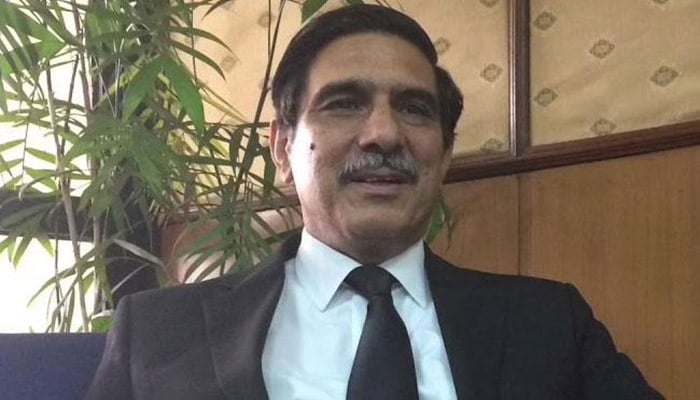ISLAMABAD: In a surprising move, Nawaz Sharif’s counsel, Khawaja Haris has recused himself from appearing in NAB references citing Supreme Court’s refusal to accept his argument as a reason for his sudden decision after representing the ousted prime minister for nine months.
A two-member bench of the SC, headed by Chief Justice Mian Saqib Nisar, on Sunday extended the deadline for all the three graft trials against former prime minister Nawaz Sharif and his family by one month on the request of an accountability court which had sought more time to wrap up the cases.
Haris, in a written submitted to the court Monday, said the top court had 'dictated on completing the trial within a month.' 'As a professional lawyer, I think the arguments for all of the three references could be presented together,' the note added.
The lawyer said that he was dictated to work beyond court hours.
“These cases should be wound up soon as the accused as well as the whole nation are undergoing mental stress and agony. This situation should be over,” the CJP remarked during Sunday hearing. Chief Justice Nisar directed NAB court judge Justice Muhammad Bashir to complete the hearing as early as possible in one month in all the three corruption cases as the accused and the people are in immense tension.
During the hearing of an application seeking the third extension for concluding trials by the Islamabad accountability court’s judge, the CJP rejected the plea filed by deposed prime minister Nawaz Sharif’s counsel, Khawaja Haris, to complete the trial in six weeks and instead asked the accountability court to conclude the trial in all the three references within one month by fixing daily hearings, including Saturdays and Sundays.
Khawaja Haris objected to the SC’s order, saying he does not work on Sundays or beyond court timing.
“You are a young man. If I could work till midnight, then why don’t you do it,” the CJP responded. However, Mr Haris insisted that the CJP could not bind him to work on Sundays, adding that his client is ready to go to jail but won’t accept justice done hurriedly. To it, the CJP said God knows better whether your client will go to jail or not but you could not intimidate the court on the plea that you won’t work on Saturdays or Sundays. The CJP asked Mr Haris to advise his client to hire some other lawyer if he was not willing to work on Sundays.
Addressing the issue of exemption from trial proceedings, the top judge remarked Nawaz, along with his daughter, could go see his ailing wife Begum Kulsoom Nawaz in London if he wanted during the trial period.
“To earn publicity, you propagate that (accountability) court does not let them (Sharifs) visit ailing Kulsoom Nawaz. Tell me when they want to go to London. You make an oral request and we will allow the same at once," the CJP said, adding that how long it will take Nawaz to return from London. The CJP further remarked the court would not allow you to abuse it if the decision comes against you.
Advocate Harris stated that this issue was not before the bench. However, the chief justice observed that the Supreme Court had powers to do complete justice. A two-member bench headed by the chief justice was hearing the petition seeking further extension for the conclusion of trails against Nawaz and his family with regard to corruption references filed by the National Accountability Bureau (NAB) after the apex court’s verdict in the Panama Papers case.
The petitioner said that concluding remarks are under way in the Avenfield reference, Wajid Zia is being prosecuted in Al Azizia reference while the statement of investigation officer is yet to be recorded. The verdict in the case cannot be declared yet, therefore, an extension is needed, he added.
The SC, in July 28, 2017 Panamagate verdict, while disqualifying Nawaz Sharif from the post of prime minister, had originally set a deadline of six months which ended in mid-March but was extended for two months after the judge requested the apex court.
Earlier, the trial court had submitted the second plea for a deadline extension, which was approved by the Supreme Court ordering both sides to finish the corruption cases by June 9.
On June 4, Accountability Judge Muhammad Bashir, while hearing the Al-Azizia reference, had remarked that he would write a letter to the Supreme Court requesting another extension to wrap up the corruption references against the Sharif family.
The corruption references, filed against the Sharifs, pertain to the Al-Azizia Steel Mills and Hill Metal Establishment, offshore companies including the Flagship Investment Ltd, and Avenfield properties of London.
Nawaz and sons Hussain and Hasan are accused in all the three references whereas his daughter Maryam and son-in-law Safdar are accused in the Avenfield reference only. The two brothers, based abroad, have been absconding since the proceedings began last year and were declared proclaimed offenders by the court. Their trial in the high-profile corruption case has been separated from other family members' owing to their continued absence.
-
Security forces gun down 30 terrorists in multiple IBOs in KP: ISPR
-
MQM-P calls for new province in Sindh
-
US report validates Pakistan military edge over India: PM
-
Banned TTP poses serious threat to Pakistan security: UNSC panel
-
CM Afridi clarifies remarks on by-poll after ECP requests army deployment
-
Dubai sees 3.2m Pakistani passengers in 2025 as airport sets new milestone
-
Security forces kill 23 Indian proxy terrorists in KP's Kurram
-
Pakistan to construct island to boost oil exploration: report












